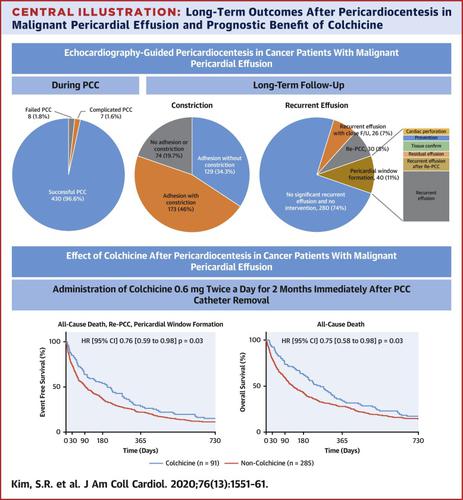当前位置:
X-MOL 学术
›
J. Am. Coll. Cardiol.
›
论文详情
Our official English website, www.x-mol.net, welcomes your feedback! (Note: you will need to create a separate account there.)
Effect of Anti-Inflammatory Drugs on Clinical Outcomes in Patients With Malignant Pericardial Effusion
Journal of the American College of Cardiology ( IF 24.0 ) Pub Date : 2020-09-01 , DOI: 10.1016/j.jacc.2020.08.003 So Ree Kim 1 , Eun Kyoung Kim 2 , Jinhyun Cho 3 , Sung-A Chang 2 , Sung-Ji Park 2 , Sang-Chol Lee 2 , Seung Woo Park 2
Journal of the American College of Cardiology ( IF 24.0 ) Pub Date : 2020-09-01 , DOI: 10.1016/j.jacc.2020.08.003 So Ree Kim 1 , Eun Kyoung Kim 2 , Jinhyun Cho 3 , Sung-A Chang 2 , Sung-Ji Park 2 , Sang-Chol Lee 2 , Seung Woo Park 2
Affiliation

|
BACKGROUND
Pericardiocentesis (PCC) with extended catheter drainage has become a relatively safe procedure to control pericardial effusion (PE), but little is known about long-term outcomes after PCC in malignant PE. OBJECTIVES
This study evaluated the effects of anti-inflammatory agents on long-term outcomes after effective drainage of PE in active cancer patients. METHODS
From May 2007 to December 2018, 445 patients with malignant PE who underwent echocardiography-guided PCC were enrolled. Clinical, laboratory, echocardiographic and procedural findings, and clinical outcome data were collected. Use of anti-inflammatory agents including colchicine, nonsteroidal anti-inflammatory drugs, or steroids after PCC was also analyzed. Colchicine was administered in a dose of 0.6 mg orally, twice a day for 2 months. The primary outcome was defined as a composite of all-cause death and re-PCC or pericardial window operation due to recurred PE. RESULTS
The procedure was successful in 97.0% of the cases, with 1 procedure-related death. During the follow-up of 2 years, 26.1% of patients developed recurrent PE, and 46.0% developed constrictive pericarditis. The colchicine treatment group showed a significantly lower risk of composite events (adjusted hazard ratio [aHR]: 0.65; 95% confidence interval [CI]: 0.49 to 0.87; p = 0.003) as well as all-cause death (aHR: 0.60; 95% CI: 0.45 to 0.81; p = 0.001) than did the noncolchicine group. On propensity score matching, colchicine after PCC was consistently associated with a lower composite events (aHR: 0.55; 95% CI: 0.37 to 0.82; p = 0.003). CONCLUSIONS
In cancer patients with malignant PE, PCC with extended drainage can be an appropriate therapeutic option and shows low complication rate. Patients receiving colchicine after successful PCC showed significant improvement in clinical outcome.
中文翻译:

抗炎药对恶性心包积液患者临床结局的影响
背景 带有延长导管引流的心包穿刺术 (PCC) 已成为控制心包积液 (PE) 的一种相对安全的方法,但对恶性 PE 患者 PCC 后的长期结果知之甚少。目的 本研究评估了抗炎药对活动期癌症患者 PE 有效引流后长期预后的影响。方法 2007年5月至2018年12月,445例接受超声心动图引导的PCC的恶性PE患者。收集了临床、实验室、超声心动图和手术结果以及临床结果数据。还分析了 PCC 后使用抗炎药,包括秋水仙碱、非甾体抗炎药或类固醇。秋水仙碱的剂量为 0.6 mg 口服,每天两次,持续 2 个月。主要结局被定义为由复发性 PE 导致的全因死亡和再 PCC 或心包窗手术的复合结局。结果 97.0%的病例手术成功,1例手术相关死亡。在 2 年的随访中,26.1% 的患者发生了复发性 PE,46.0% 的患者发生了缩窄性心包炎。秋水仙碱治疗组的复合事件风险显着降低(调整风险比 [aHR]:0.65;95% 置信区间 [CI]:0.49 至 0.87;p = 0.003)以及全因死亡(aHR:0.60; 95% CI:0.45 至 0.81;p = 0.001) 与非秋水仙碱组相比。在倾向评分匹配中,PCC 后秋水仙碱始终与较低的复合事件相关(aHR:0.55;95% CI:0.37 至 0.82;p = 0.003)。结论 在恶性 PE 的癌症患者中,延长引流的 PCC 可能是一种合适的治疗选择,并且并发症发生率低。成功 PCC 后接受秋水仙碱的患者临床结果显着改善。
更新日期:2020-09-01
中文翻译:

抗炎药对恶性心包积液患者临床结局的影响
背景 带有延长导管引流的心包穿刺术 (PCC) 已成为控制心包积液 (PE) 的一种相对安全的方法,但对恶性 PE 患者 PCC 后的长期结果知之甚少。目的 本研究评估了抗炎药对活动期癌症患者 PE 有效引流后长期预后的影响。方法 2007年5月至2018年12月,445例接受超声心动图引导的PCC的恶性PE患者。收集了临床、实验室、超声心动图和手术结果以及临床结果数据。还分析了 PCC 后使用抗炎药,包括秋水仙碱、非甾体抗炎药或类固醇。秋水仙碱的剂量为 0.6 mg 口服,每天两次,持续 2 个月。主要结局被定义为由复发性 PE 导致的全因死亡和再 PCC 或心包窗手术的复合结局。结果 97.0%的病例手术成功,1例手术相关死亡。在 2 年的随访中,26.1% 的患者发生了复发性 PE,46.0% 的患者发生了缩窄性心包炎。秋水仙碱治疗组的复合事件风险显着降低(调整风险比 [aHR]:0.65;95% 置信区间 [CI]:0.49 至 0.87;p = 0.003)以及全因死亡(aHR:0.60; 95% CI:0.45 至 0.81;p = 0.001) 与非秋水仙碱组相比。在倾向评分匹配中,PCC 后秋水仙碱始终与较低的复合事件相关(aHR:0.55;95% CI:0.37 至 0.82;p = 0.003)。结论 在恶性 PE 的癌症患者中,延长引流的 PCC 可能是一种合适的治疗选择,并且并发症发生率低。成功 PCC 后接受秋水仙碱的患者临床结果显着改善。


























 京公网安备 11010802027423号
京公网安备 11010802027423号